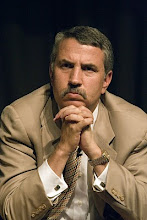I was fortunate to be in Fort Meade on June 3 when defense attorney David Coombs delivered his opening statement, and described the onset of Manning's struggles quite differently.
It was 24 December, 2009. He was 22 years young, in Iraq, his first deployment, his first unit. He was excited to be in Iraq, and he was excited to achieve his mission, and hopefully make Iraq a safer place.I may have missed it but I've never seen this story recounted in the mainstream media. It certainly wasn't in today's Times. But there's a strong case to made that if Manning felt isolated in Iraq, it had less to do with the childhood video games than with the fact he didn't feeling like partying after an Iraqi child was killed.
The EFP [Explosively Formed Projectile] alert that went out on that day broke the silence of an otherwise calm Christmas Eve. EFP had claimed the lives of too many soldiers. So when an alert went out, everybody in the TOC [Tactical Operation Center] and in the SCIF [Sensitive Compartmented Information Facility] went into an immediate frenzy to get information.
PFC Manning was sent from the SCIF to the POC to find out what he could find out about the EFP. At that point all they really knew was that an element of the 210 was driving down a road that was rarely used and the lead element had been [inaudible to transcriber]
PFC Manning went to get some additional information but none could be found. They didn't have any updates, so he went back to the SCIF empty-handed. A few tense moments later came the welcome news. Despite the lead element being hit, no soldiers were killed, no soldiers were injured. Everyone in the TOC started celebrating, everyone in the SCIF started celebrating. Good news was welcome on any day, but especially on Christmas Eve.
A few minutes later came some additional news about that EFP, and the report indicated that as the lead element was driving down this road there was this civilian car in front of them, and that civilian car pulled over to the side, as was typical, to allow the convoy to go by, and they pulled over right in front of where that EFP was placed. The car had five occupants, two adults and three children. And that EFP went right through that car and hit that lead element. All five of the occupants were taken to the hospital, one died en route. Everyone in the TOC, in the SCIF was celebrating. Everyone was happy.
Everyone but PFC Manning. He couldn't celebrate. He couldn't be happy. The reason why is he couldn't forget about the life that was lost on that day. He couldn't forget about the lives and the family that was impacted on that Christmas Eve.
And from that moment forward PFC Manning started a struggle.
It is amazing how little, more than 3 years after Manning's arrest, even well-meaning people know about the actual content that Manning leaked or his actual reasons for leaking. For example, even among many of his supporters there's a sense that Manning leaked for the sake of transparency. But Manning, as least as I read his own words, believed in transparency as a tactic, not the end goal. He wanted to stop the U.S. from committing atrocities -- both of war and "diplomacy" -- in other countries and he used the only weapon he had at his disposal -- information -- to try to do so.
Michael Ratner has argued that one reason for the secret trial is that the government knows that Manning is such a sympathetic defendant. I agree. Which is why it's so infuriating -- and telling -- that the Times would rather send its armchair psychologists to root through Manning's childhood than let his actions and words speak for themselves.
.jpg)